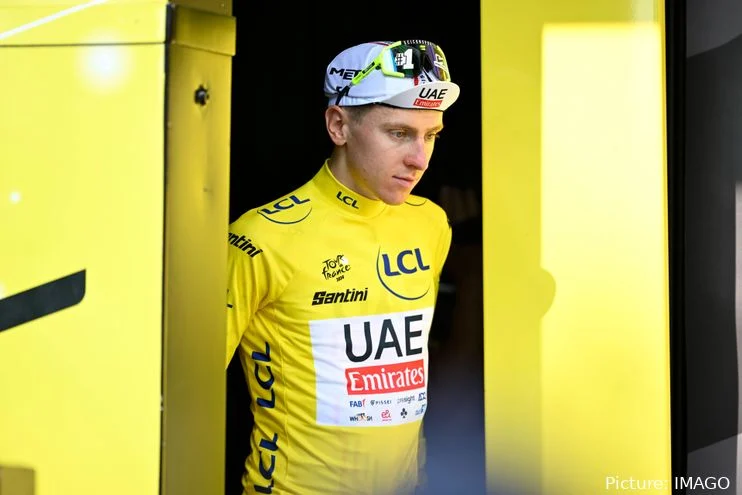In a sport with a turbulent history of doping scandals, Christian Prudhomme, the director of the Tour de France, has weighed in on the cloud of suspicion surrounding two-time Tour winner Tadej Pogačar.
Prudhomme’s candid acknowledgment of the concerns has resonated across the cycling world, with his statement, “Given cycling’s past, the question is not an illegitimate one,” showing an openness about the lingering doubts that continue to plague even modern champions.

Cycling has long battled the taint of performance-enhancing drugs (PEDs). From the days of the Festina scandal in 1998 to the infamous revelations about Lance Armstrong, the sport has been trying to rebuild its reputation for decades. Despite stringent testing protocols and an enhanced commitment to clean racing, skepticism has never fully disappeared. For many fans, any extraordinary performance on a bike comes with a side of suspicion.
In this context, Prudhomme’s comment reflects a somber understanding of where the sport stands today. While cycling has made great strides to weed out doping, its history casts a long shadow, and even clean athletes find themselves subject to scrutiny. Prudhomme is not dismissing the concerns but rather suggesting that questioning a rider’s performance, in light of the past, is understandable.
Tadej Pogačar’s meteoric rise has been nothing short of extraordinary. Since his breakout win at the Tour de France in 2020, the Slovenian cyclist has dominated the peloton with ease, winning multiple Grand Tours, one-day classics, and generally looking unbeatable at his best. His combination of climbing ability, time-trialing strength, and tactical acumen has earned him a place among cycling’s elite at just 25 years old.
But with greatness comes scrutiny. Some critics have raised questions about the nature of Pogačar’s dominance, particularly in an era where the sport is still healing from its past scandals. Prudhomme’s statement acknowledges this reality, not as a critique of Pogačar, but as a reminder that trust in cycling is something still being rebuilt, step by step.
Prudhomme’s openness about the doping doubts signals a push for greater transparency in the sport. Pogačar himself has consistently denied any involvement with doping and has submitted to all required testing protocols. Both his team, UAE Team Emirates, and the sport’s governing body, the Union Cycliste Internationale (UCI), have vouched for the integrity of their testing processes. Nevertheless, doubts persist, largely because of cycling’s history rather than any concrete evidence against Pogačar.
Prudhomme’s statement, while acknowledging the legitimate concerns, is also a plea for fairness. It suggests that while the questions may be reasonable given cycling’s past, they should not automatically lead to assumptions about a rider’s guilt. For athletes like Pogačar, who are trying to forge a clean legacy, the burden of proof is often placed unfairly on them, even when they consistently adhere to testing protocols.
As Pogačar prepares for future races, the weight of the sport’s history will likely continue to follow him. However, Prudhomme’s remarks may help steer the conversation towards constructive dialogue rather than outright suspicion. He seems to suggest that while it’s okay to ask hard questions, it’s equally important to let clean athletes prove themselves through their actions and performances.
The future of cycling depends on building that trust with both the athletes and the fans. If Pogačar can maintain his dominance under the strictest anti-doping protocols, he has the potential to emerge as a symbol of cycling’s new era—a period where extraordinary performances can once again be celebrated without suspicion.
In the end, Prudhomme’s comments remind us all that while cycling’s past may never be fully forgotten, the sport is still moving forward. The question of doping may never completely disappear, but as long as the sport remains committed to transparency, there is hope that the next generation of champions can be celebrated for their talent, not doubted for it.
